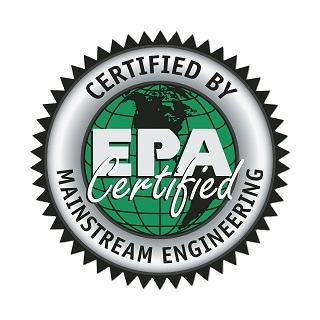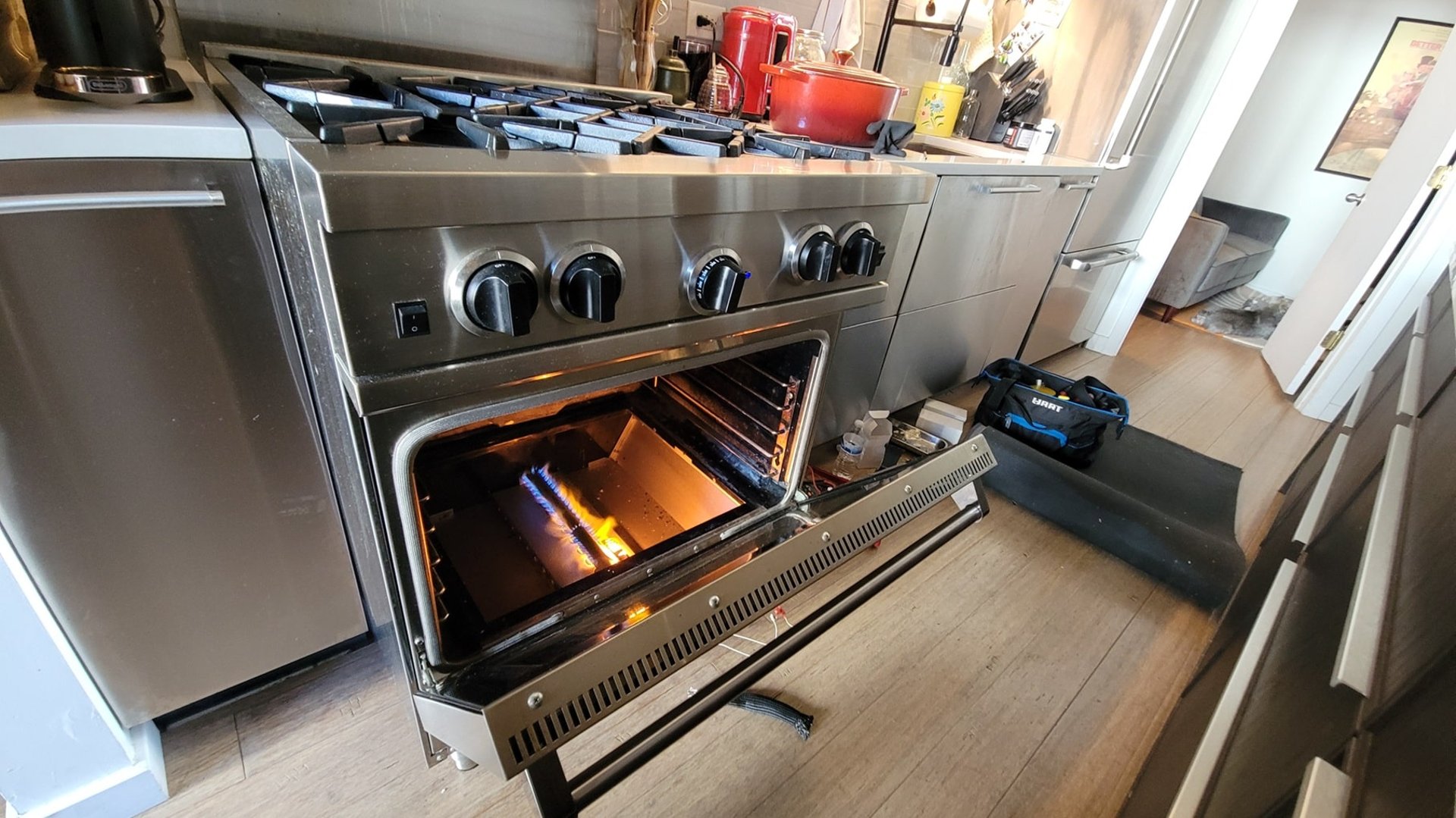
We Help Households Restore The Kitchen’s Heart with Fast, Affordable Oven Repair across Long Beach, Anaheim, Los Angeles, and Nearby Areas!
Gas Leaks
Not Heating
Uneven Heating
Unusual Noise or Smell
Faulty Bake or Broil
When your oven breaks down, it can cause a lot of inconvenience. Below is a detailed breakdown of how our expert technicians restore your oven to its full functionality. The service call fee is waived when you proceed with any repair!
Fast and Affordable Oven Repair
1. Initial Contact and Free Consultation
The first step is easy! Contact us today, and our friendly customer service team will schedule an appointment for your oven repair. We understand the urgency, so we prioritize timely visits. Plus, remember that the service call fee is waived with any repair, making it a risk free experience for you.
2. Technician Arrival and Inspection
Once we arrive, our certified oven repair technician will carefully assess your oven. We inspect both electrical and gas components, check the heating elements, thermostat, control board, and more. Our diagnostic procedure ensures we pinpoint the exact cause of the issue quickly and efficiently. No guesswork, just accurate, honest analysis.
3. Providing a Transparent Repair Estimate
After diagnosing the problem, we’ll explain what needs fixing. You’ll receive a transparent repair estimate that outlines the cost of parts and labor. If you’re satisfied with the estimate, we proceed with the repairs right away. There’s no obligation, and you’re in control every step of the way.
4. Quick and Efficient Oven Repair
Our technicians come prepared with the necessary tools and replacement parts to complete most oven repairs on the spot. Whether it’s a broken heating element, faulty temperature sensor, or a malfunctioning oven control board, we’ve got you covered. We work swiftly to get your oven back in working order.
5. Testing and Quality Check
When repair is complete, we run multiple tests. This includes checking for temperature consistency, even heating, and verifying all settings and features work perfectly. We don’t leave until your oven passes our quality control check, ensuring it operates efficiently and safely.
6. Customer Satisfaction and Post repair support
Your satisfaction is our priority! We’ll make sure all your questions are answered before we leave. We also offer post repair support to help with any concerns or questions you might have after the repair. Plus, you’ll get our warranty on parts and labor, giving you peace of mind that your oven will stay in top shape.
Why Choose Us?
No Service Call Fee with Any Repair: We believe in providing value to our customers. If you choose to repair your dryer with us, we’ll waive the service call fee!
Experienced Technicians: Our team is highly trained and experienced in dryer repairs. You can trust us to get the job done right the first time.
Fast and Convenient Service: We know how important your dryer is to your daily life. We offer flexible scheduling and prompt service to get your appliance working again without the wait.
100% Satisfaction Guarantee: If you're not happy with our service, we’ll make it right.
Don’t wait for the problem to get worse, contact us today for a fast oven repair and enjoy a fully functional kitchen once again. Whether it’s a gas oven repair or electric oven repair, we’re here to help. Call now, and let us restore your oven to optimal performance!
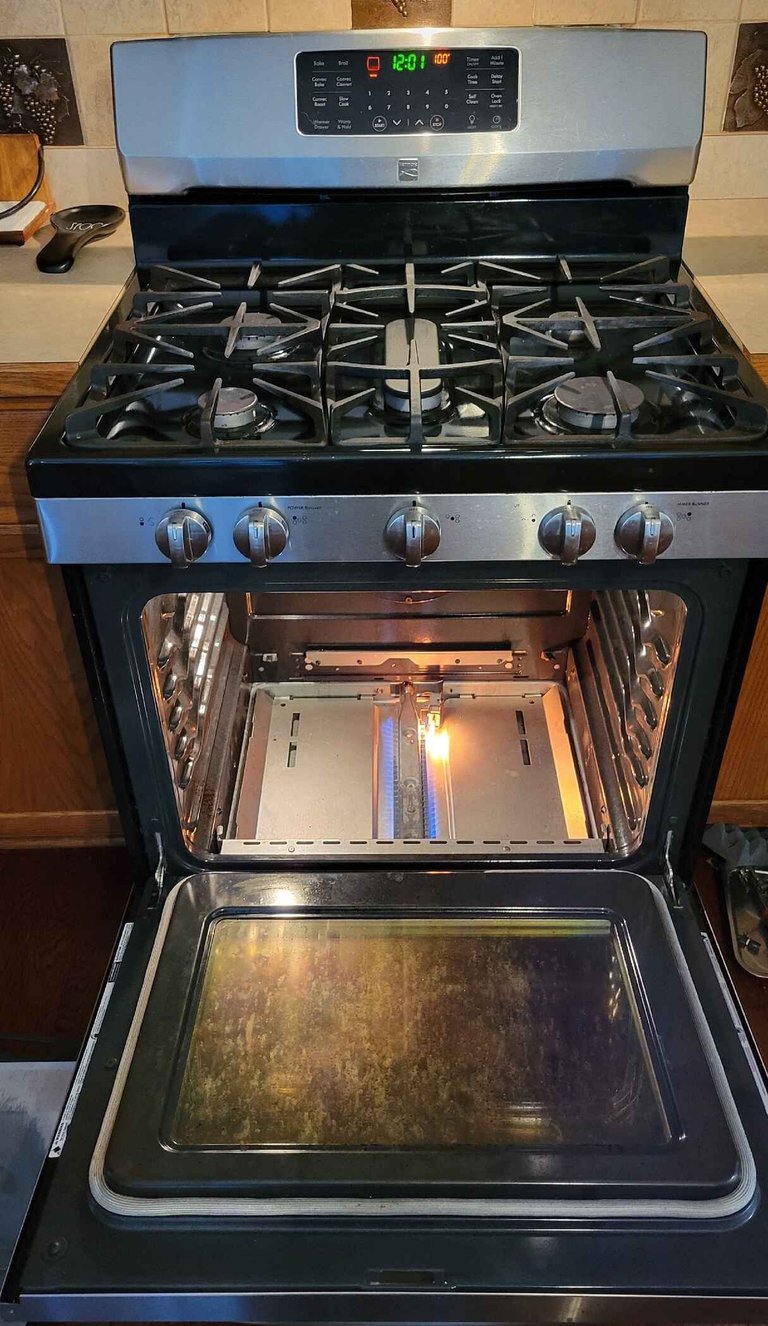


What motivates our customers to choose us for home appliance repair?
Affordable prices
Licensed Certified Insured
Guaranteed satisfaction
Warranty
We firmly believe that customer satisfaction is the cornerstone of our success.
Upfront, and transparent pricing. No hidden fees. Free service call with any repair!
When you choose us, you're choosing quality, professionalism, and reliability!
On parts and labor, providing you with confidence that your appliance is repaired correctly.
We breathe new life into appliances from all major brands!
If you can't find your brand, just give us a call! Chances are we have worked on that brand many times before.






Detect & Troubleshoot Common Oven Problems
2. Oven Temperature Is Inconsistent
Signs: The oven seems to be heating unevenly, with some areas hotter than others.
Causes:
Dirty or faulty temperature sensor: The sensor that measures the oven’s temperature might be malfunctioning.
Miscalibrated thermostat: The thermostat may no longer be accurately regulating the oven temperature.
Damaged heating element: A partially working heating element can cause uneven heat distribution.
How to Detect:
Use an oven thermometer to check for temperature consistency at different spots inside the oven.
If you have a model with multiple heating elements (like top and bottom), see if one is heating more than the other.
Troubleshooting:
Sensor: Clean the temperature sensor and check its connection. If it's faulty, replace it.
Thermostat: If it's inaccurate, recalibrate or replace the thermostat.
Heating element: If it’s damaged, replace the element to ensure even heat distribution.
3. Oven Door Won't Close Properly
Signs: The oven door doesn't latch shut or doesn’t seal correctly.
Causes:
Warped door: Over time, the oven door might bend or become misaligned.
Broken door latch or hinges: The latch or hinges could be damaged or worn out.
Dirty door seal: A buildup of food or grease can prevent the door from sealing properly.
How to Detect:
Inspect the door's alignment and hinges to check if they're bent or damaged.
Check the door seal for dirt or debris. It should make full contact with the oven frame when closed.
Troubleshooting:
Door hinges: Tighten or replace the door hinges if they're loose or bent.
Seal: Clean the door seal thoroughly. If it's worn or damaged, replace it.
Door alignment: Adjust the door to align with the oven frame. If it’s significantly bent, a replacement might be necessary.
5. Oven Light Not Working
Signs: The oven light fails to turn on when you open the door.
Causes:
Burnt-out bulb: The light bulb in the oven may have burned out.
Faulty switch: The door switch or light switch may not be functioning properly.
Electrical issue: There could be a wiring problem affecting the light.
How to Detect:
Check if the bulb is loose or visibly burnt out. Also, try to turn the light on manually to see if it works.
Inspect the light switch and check if it’s making proper contact.
Troubleshooting:
Replace the bulb: If the bulb is burnt out, replace it with a new one.
Test the switch: If the bulb is fine, but the light still doesn’t work, test the door switch or light switch for continuity.
Electrical issue: If the switch is functioning, check for wiring issues that could require professional repair.
6. Oven Is Making Strange Noises
Signs: Unusual humming, buzzing, or clicking noises while the oven is on.
Causes:
Faulty fan: If your oven has a fan, it might be malfunctioning, causing a loud noise.
Loose parts: Some internal components, such as the heating element or fan, may be loose.
Overheating: If the oven is overheating, it might produce unusual sounds as a result.
How to Detect:
Listen for where the noise is coming from. If it’s from the fan, it could be the fan motor or blade.
Check for loose parts inside the oven.
Troubleshooting:
Fan issues: If the fan is noisy or not working properly, clean it, and check if the blades are obstructed. If the motor is faulty, it may need to be replaced.
Loose parts: Tighten any loose screws or components inside the oven that might be vibrating.
Overheating: Ensure the oven isn’t overheating, as this can be a sign of a malfunctioning thermostat or another issue.
Electric ovens are common household appliance, but they can experience problems from time to time. Here are some of the most common electric oven issues, how to detect them, and how to troubleshoot each:
1. Oven Not Heating
Signs: The oven doesn’t heat up at all or doesn’t reach the desired temperature.
Causes:
Faulty heating element: The bake or broil element may be broken.
Thermostat issue: The oven's thermostat could be malfunctioning, leading to incorrect temperature readings.
Power supply issue: There could be a disruption in power, such as a tripped circuit breaker or blown fuse.
How to Detect:
Check if the heating element glows red when the oven is on (for bake or broil settings). If it doesn’t, it's likely defective.
Use an oven thermometer to check the accuracy of the temperature. If it’s off, the thermostat may be faulty.
Inspect the power supply by ensuring the oven is plugged in properly and the circuit breaker hasn't been tripped.
Troubleshooting:
Heating element: If the element is broken (visible cracks or damage), replace it.
Thermostat: If the temperature doesn’t match the oven’s setting, the thermostat may need recalibration or replacement.
Power issue: Reset the circuit breaker or replace any blown fuses.
4. Smell of Burning
Signs: A gas smell when the oven is on, or a strong burning odor.
Causes:
Gas leak: A serious safety concern if you have a gas oven; it may be leaking gas.
Burnt food: Sometimes a strong odor can be caused by food remnants in the oven.
Dirty heating elements: Debris or grease buildup on the heating element can cause a burning smell.
How to Detect:
If you smell gas, immediately turn off the oven, open windows, and leave the house to avoid danger.
If the smell is burnt food or grease, check for food debris on the elements.
Troubleshooting:
Gas leak: If you suspect a gas leak, shut off the gas supply and call a professional technician immediately.
Burnt food: Clean the oven thoroughly, focusing on the heating elements.
Dirty elements: If you suspect grease buildup, clean the elements carefully.
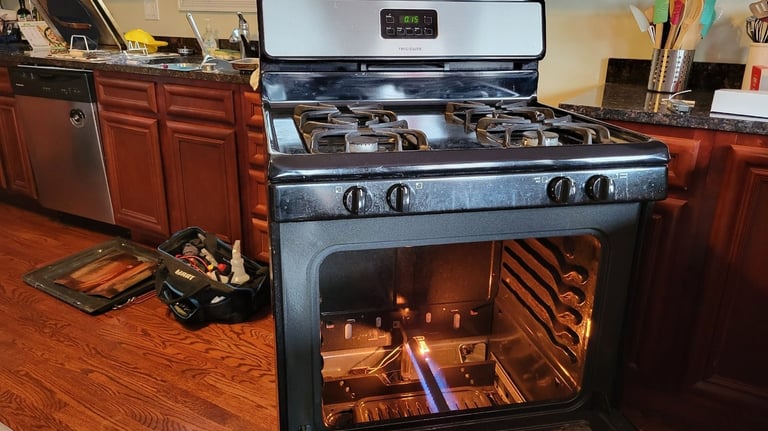

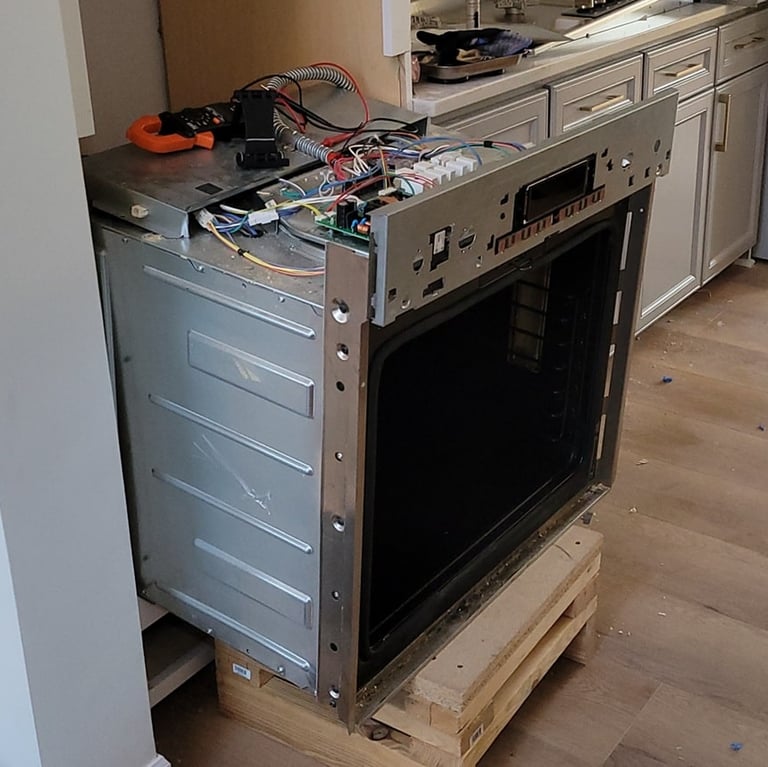

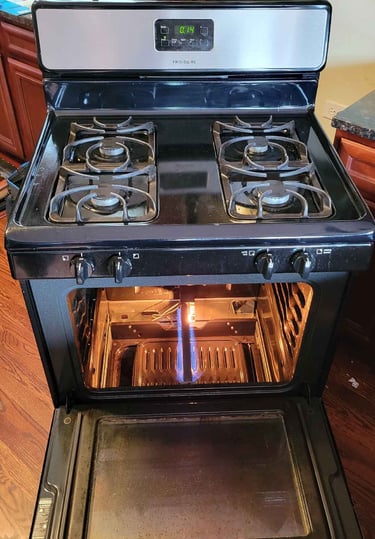

Gas ovens and electric ovens each have their unique set of problems, primarily due to their different heating methods. Below are some common issues associated with gas ovens, how to detect and troubleshoot them:
1. Oven Not Heating
Cause: A faulty gas valve, igniter, or thermocouple could prevent the oven from heating.
Detection: The oven doesn't heat up or the flame doesn’t ignite when you turn it on.
Troubleshooting:
Test the igniter: If it doesn’t glow or stay lit, it may need replacing.
Check the gas supply: Make sure the gas line is open and unobstructed.
Inspect the thermocouple: If it’s defective, replace it.
2. Inconsistent or Low Flame
Cause: A clogged burner or gas flow issue can cause an uneven or weak flame.
Detection: The flame may appear weak, uneven, or flickering when the oven is on.
Troubleshooting:
Clean the burners: Check for debris or grease buildup and clean them.
Check the gas pressure: Ensure the gas pressure is set correctly and that there is no blockage in the line.
3. Gas Odor or Leak
Cause: Leaking gas lines or a malfunctioning gas valve can lead to gas odors.
Detection: A gas smell when the oven is off or while it's in use indicates a potential leak.
Troubleshooting:
Turn off the gas supply: If you smell gas, immediately shut off the gas and do not use the oven.
Inspect for leaks: Use soapy water to check the gas connections for bubbles, which indicate a leak.
Call a professional: Gas leaks are dangerous, so a licensed technician should inspect and repair.
4. Oven Temperature not Matching Setting
Cause: A malfunctioning oven sensor, thermostat, or gas valve could cause temperature issues.
Detection: The oven is too hot or too cold compared to the set temperature.
Troubleshooting:
Check the oven sensor: Use a multimeter to test the sensor’s continuity.
Inspect the gas valve: Ensure it opens and closes properly to regulate the flame.
5. Faulty Ignition
Cause: A defective igniter can prevent the oven from starting.
Detection: The oven doesn’t ignite when you try to turn it on.
Troubleshooting:
Test the igniter: If it doesn’t glow or ignite, it’s likely faulty and needs replacing.
Check the gas flow: Make sure the gas valve is open.
6. Oven Light Not Working
Cause: This could be a burnt out light bulb or a wiring issue.
Detection: The light inside the oven doesn’t turn on when the door is opened.
Troubleshooting:
Replace the light bulb: Check if the bulb has burned out and replace it.
Inspect the wiring: Ensure that the wiring to the light is intact and not disconnected.
7. Excessive Heat or Oven Too Hot
Cause: A malfunctioning thermostat or temperature sensor could cause the oven to overheat.
Detection: The oven becomes too hot, even when set to a lower temperature.
Troubleshooting:
Check the thermostat: Test it with a thermometer to see if it’s regulating temperature properly.
Inspect the temperature sensor: If it’s faulty, it may give inaccurate readings, leading to overheating.
8. Uneven Heating
Cause: This may result from clogged burners, a faulty gas valve, or issues with the oven fan.
Detection: The food cooks unevenly, with hot and cold spots.
Troubleshooting:
Clean the burners: Ensure the burners are clean and free of debris.
Check the gas valve: Ensure the valve is functioning properly and evenly distributing gas.
Check the oven fan: Make sure the fan is working to circulate heat.
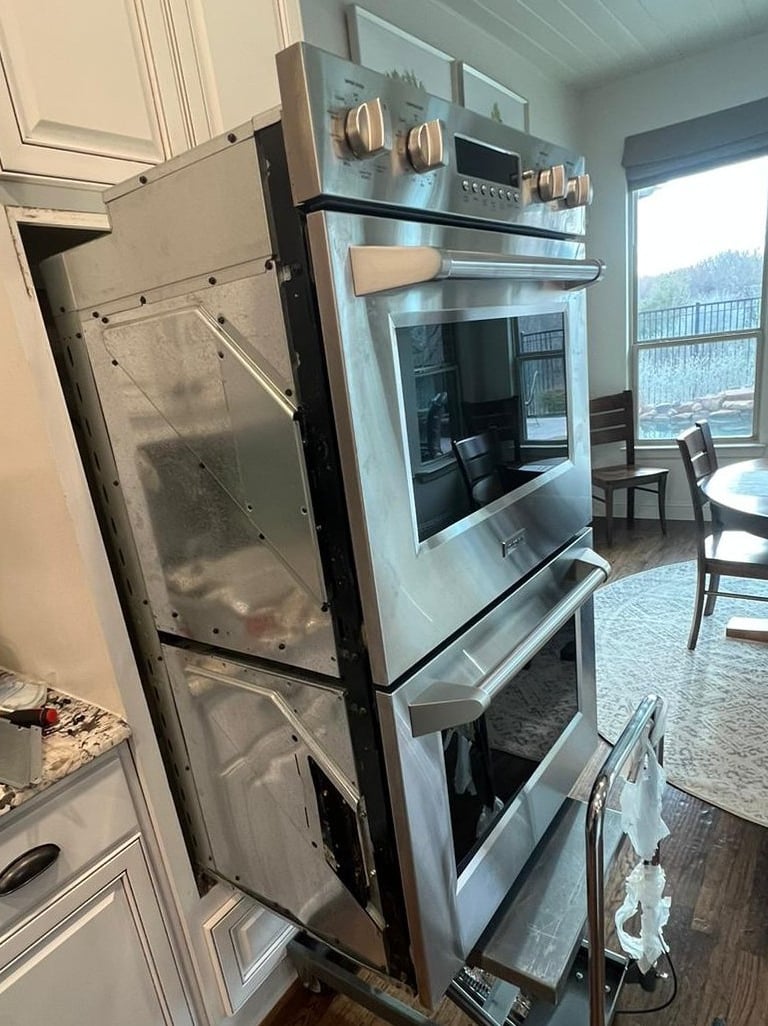

General Troubleshooting Tips
Read the Manual: Consult your oven’s manual for specific troubleshooting tips related to your model.
Temperature Calibration: Regularly verify the oven temperature with an oven thermometer, regardless of the oven type.
Regular Cleaning: Keep burners and heating elements clean to ensure proper operation.
Safety First: If you're dealing with gas and detect any smell or leak, prioritize safety and contact a professional.
Reviews
”My oven unexpectedly stopped working recently, and I reached out to Aspeco for help. We scheduled a visit and luckily they offered same day service...”
Jessica P.
”After calling this company, I was impressed by how quickly they sent someone out. The technician was friendly and fixed the issue with the temperature...”
Garry D.
”I love the oven repair service I received! My oven stopped heating properly, and I was worried I’d need a costly replacement...”
Jake M.
”You did a fantastic job fixing my oven! I was truly impressed by quick response and your professionalism . Now everything is running perfectly...”
★★★★★
★★★★★
★★★★★
★★★★★
Scarlett T.
Aspeco Appliance Repair has been proudly serving Los Angeles and Orange counties. That includes the following areas:
Service Area
Anaheim
Buena Park
Costa Mesa
Fullerton
Garden Grove
Huntington Beach
Irvine
Laguna Niguel
Mission Viejo
Newport Beach
Orange
Santa Ana
Tustin
Westminster
Yorba Linda
Bellflower
Carson
Cerritos
Compton
Downey
Gardena
Hawthorne
Inglewood
Lakewood
Long Beach
Los Angeles
Norwalk
Paramount
South Gate
Torrance
Frequently asked questions (FAQ)
1. How do I know if my oven needs repair?
Common signs that your oven may need repair include inconsistent heating, a malfunctioning thermostat, the oven not turning on, or gas odors (for gas ovens). If your oven is not maintaining temperature, making unusual noises, or showing error codes, it’s best to have it inspected by a professional technician.
2. How long does an oven repair take?
The time required for an oven repair varies depending on the problem. Minor repairs, such as replacing a heating element or igniter, usually take about an hour. More complex issues, like replacing a gas valve or thermostat, may take longer. Our technicians aim to complete repairs quickly and efficiently, often during the first visit.
3. Are oven repairs covered by a warranty?
Yes, we offer warranties on all of our oven repairs. The length of the warranty depends on the part that was replaced, but we stand behind our work and guarantee our repairs. Be sure to ask our technician for the specific warranty details during your service.
4. Can I repair my oven myself?
While some minor issues, like cleaning burners or replacing a light bulb, can be done by homeowners, it’s not advisable to attempt more complex repairs yourself especially when dealing with electrical components or gas. Improper repairs can lead to safety hazards, further damage, or void warranties. It’s always best to trust a professional.
5. My oven smells like gas. What should I do?
If you smell gas coming from your oven, immediately turn off the gas supply and avoid using any electrical appliances, including your oven’s ignition system. Open windows for ventilation and contact a professional repair service immediately. Gas leaks are serious and should always be handled by a certified technician.
6. How much will my oven repair cost?
The cost of an oven repair depends on the issue, the type of oven, and the parts required. We offer upfront pricing and will provide you with an estimate after diagnosing the problem. Our goal is to ensure transparency and offer fair, competitive pricing without hidden fees.
7. Do you repair both gas and electric ovens?
Yes, we repair both gas and electric ovens. Whether you have a gas oven that isn’t igniting properly or an electric oven with a faulty heating element, we have the expertise to diagnose and repair any issue. Our technicians are experienced with all oven types and models.
8. How can I schedule an oven repair appointment?
Scheduling an oven repair is easy! Simply contact us through our website or call our customer service team. We offer convenient appointment times, including same day or next day services in many cases. Let us know your availability, and we’ll work to accommodate your schedule.
@aspecoappliancerepair
Services
Aspeco
Mon-Sun
8:00am - 7:00pm
Contacts
Business hours
